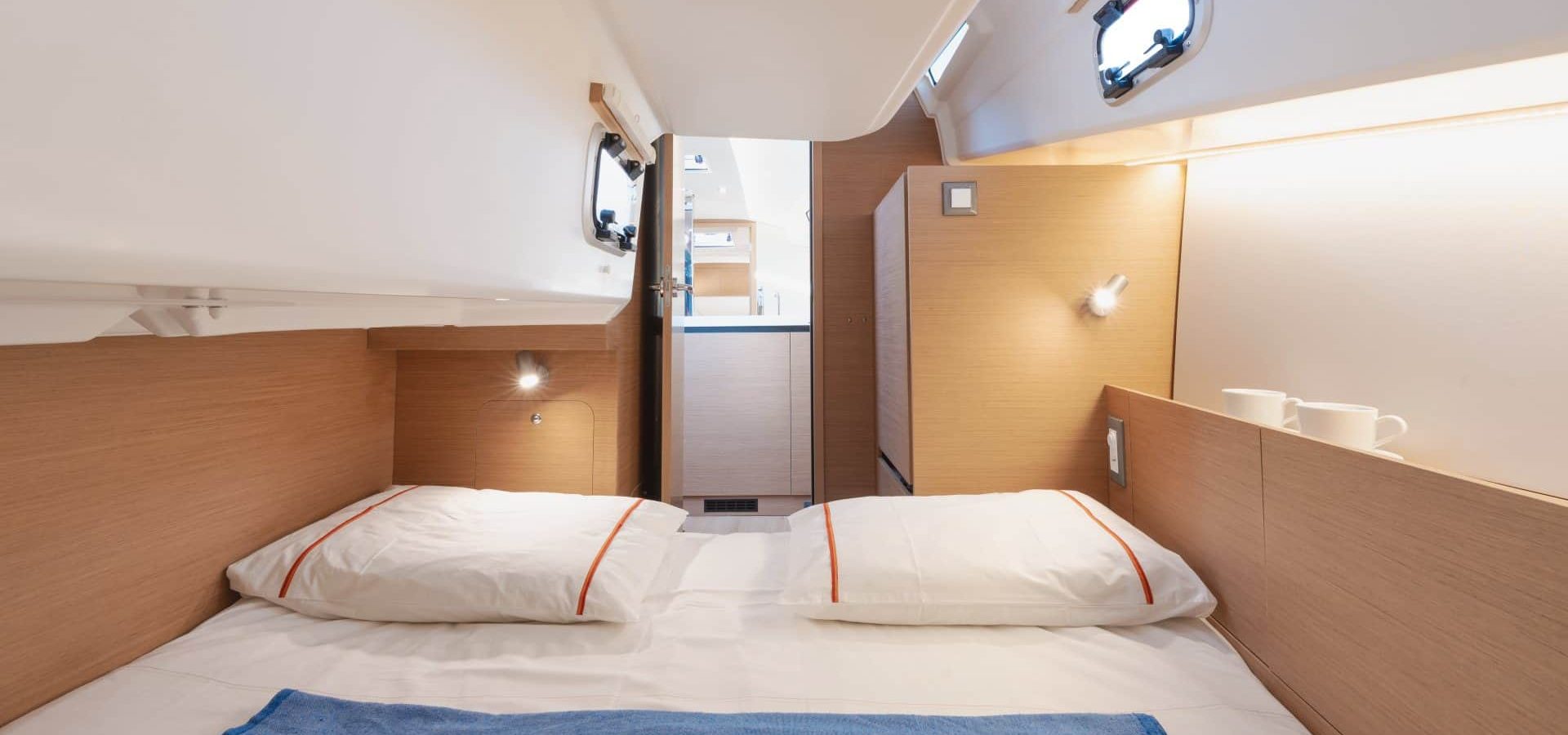Can you imagine rocking on the waves while you sleep? Sleeping on a boat is a unique experience that connects you with the sea in a special way. However, not everything is rosy: there are also some challenges that you should keep in mind.
At Motyvel Group, we know all the necessary aspects to make sure you can sleep well on a boat and turn your cabin into an oasis of tranquility. Next, we share a series of practical tips to ensure you enjoy a restful sleep during your journey. Let’s start!
Sleeping on a Boat Moored to the Port
Are you a sea lover who enjoys the tranquility of a port at night? Or maybe, do you prefer the vibrant energy of nightlife in a marina? Whatever your preference, sleeping in a port has its pros and cons that you should know before setting sail.
Advantages of Sleeping in a Port
Firstly, sleeping in a port guarantees a peaceful night. You can enjoy the stability and gentle rocking of the boat without the open sea waves. In addition, with all the amenities at your fingertips: electricity, fresh water, and connections that will make your stay more comfortable.
On the other hand, it ensures your safety in case of emergency. A port offers you a safe refuge in case of bad weather or any unforeseen event.
Disadvantages of Sleeping in a Port
The bustle of port activity can disturb your sleep, as sometimes, in ports, there are annoying noises.
On the other hand, the swell generated by other boats can rock you as if you were in the high seas, making it difficult for you to fall asleep. Finally, some ports charge fees for overnight stays, something important to consider in your budget.
Tips for a Peaceful Night in Port
As we have mentioned, sleeping in a port can be a magical experience, full of tranquility and the fresh sea breeze. However, some details can disturb your sleep. Don’t worry! With these tips, you’ll sleep like a baby.
1. Choose a Cozy Port
Research ports known for their tranquility and night-time security. Ask for recommendations from other sailors: experience is knowledge!
2. Look for a Safe Haven
Choose ports well protected from the wind and currents for an undisturbed rest and look for moorings that minimize the swell from other boats.
3. Create a Dreamy Atmosphere
Use earplugs and block out external noise. Turn off everything, generators, air conditioning, and any source of noise that might disturb your rest.
4. Enjoy the Magic of the Sea
Relax and take a deep breath: let the gentle swaying lull you. Listen to the sounds of the port. Ports have very characteristic sounds that although sometimes can be annoying, other times can form a nocturnal symphony that will help you fall asleep. Above all, disconnect and enjoy.
Sleeping Anchored
But if what seduces you is the idea of sleeping under a starry sky
, rocked by the waves in the stillness of the night, sleeping on a boat at sea is the best option. Anchoring your boat in a secluded bay can be an unparalleled experience. However, before setting sail on the adventure, it is important to know the advantages and disadvantages of this practice.
Advantages of Sleeping at Sea
The advantages of spending the night at sea are numerous and attractive for nature and adventure lovers. The first of these advantages is the limitless freedom this experience offers. You will have the opportunity to choose the perfect spot to anchor your vessel and immerse yourself in nature in its purest form, without restrictions or limits.
Along with this freedom comes a sense of pure tranquility. By distancing yourself from the hustle and bustle of urban life and daily worries, you can disconnect and immerse yourself in the silence and peace that only the sea can offer. Additionally, each morning brings a special gift: magical dawns. Waking up with the first rays of sun while at sea is an incomparable experience, providing the opportunity to witness a unique and thrilling natural spectacle.
Lastly, spending the night at sea is an invitation to adventure and total disconnection. Experiencing nautical life in its maximum expression means diving into a world of new emotions and sensations, where every moment is an opportunity to explore and discover.
Disadvantages of Sleeping at Sea
The disadvantages of spending the night at sea can affect the navigation experience in various ways. Firstly, safety is a common concern. It is crucial to find an anchoring spot that ensures protection against the elements and provides safety for both the vessel and its occupants.
Additionally, constant vigilance is required to monitor weather conditions and the state of the sea. Being attentive to these factors is essential to avoid unpleasant surprises and ensure a safe journey. The constant movement of the boat can also be a disadvantage for some. The swaying of the boat can make sleep and rest difficult, affecting the comfort and overall experience of the night at sea.
Lastly, limited access to basic services such as water or electricity can pose a challenge depending on the location. This may require careful planning and the adoption of additional measures to ensure comfort during the voyage.
Tips for a Peaceful Night at Sea
Anchoring your boat in a hidden cove can be a magical experience. But before setting sail on the adventure, it is important to become an expert in selecting the ideal place for your anchorage.
1. Look for the Right Depth
- Imagine your anchor embracing the seabed: Choose a place with the ideal depth for it to hold firmly.
- Sand, mud, or rock: Research the type of seabed to ensure the anchor has the best hold.
2. Protect Yourself from the Whims of the Sea
- Avoid tricky winds: Look for a natural shelter that protects you from gusts and currents.
- Observe the sky and the sea: Pay attention to weather conditions and look for a safe place for your vessel.
3. Become an Expert Captain
- Nautical charts, your best ally: Decipher the secrets of the seabed and danger zones with the help of nautical charts.
- Technology at your service: Use GPS to navigate with precision and find the perfect spot to anchor.
4. Share the Adventure with Camaraderie
- Connect with the nautical community: Inform other sailors of your location and anchoring. Navigate with respect,
- Share space with other boats and take care of the marine environment.
What is the Best Place to Sleep on a Boat?
Do you enjoy the privacy of a cabin or prefer sleeping under the vastness of the starry sky? The ideal place to sleep on a boat depends on several factors, such as the size of the boat, the crew, and your own preferences.
1. Crew Distribution
Cabins for everyone: If the crew is large, assign cabins or resting areas equitably. Consider each person’s preferences for greater comfort. On small boats, berths in the salon or cabin may be a good option.
2. Alternatives for Comfortable Rest
Private cabins, shared bunks, or even convertible sofas into beds. You decide! Above all, adapt the space to your needs. The salon or cabin can be transformed into cozy bedrooms.
3. Factors to Consider
Look for a quiet place, away from the engine or passageways: If you need silence and total darkness, choose a cabin. Above all, make sure the bed is comfortable and the temperature is suitable.
Recommendations for a Better Experience
To ensure a restorative rest at sea, the following tips for sleeping on the boat can be followed:
1. Keep the cabin clean, tidy, and well-ventilated
It’s important to create an environment conducive to sleep. Use comfortable bedding and adjust the temperature according to each person’s preferences.
2. Use devices like stabilizers or motion dampeners
They can be very helpful in reducing the boat’s rocking and minimizing the sensation of seasickness during the night. This can improve sleep quality and provide a more comfortable experience on board.
3. Ensure a pleasant temperature
in the cabin by using heating or air conditioning systems, depending on the weather conditions. In addition, it’s important to ensure proper ventilation to refresh the air and prevent a stifling sensation.
4. Establish a Routine
Before going to sleep can help prepare your body and mind for a proper rest. This may include relaxing activities like reading a book, listening to soft music, or practicing breathing exercises. Also, it’s advisable to avoid caffeine or heavy meals before bedtime, as they can interfere with sleep. Maintaining regular rest schedules can also help synchronize your biological clock and improve sleep quality on board.
Conclusions
As we have seen, sleeping on a boat can present various challenges and considerations. It’s crucial to take into account the advantages and disadvantages of each situation, as well as implementing practical tips to ensure a peaceful and restorative night.
Choosing the place to anchor requires attention to details such as depth, seabed type, and protection against winds and currents. Additionally, having the right equipment and following safe anchoring techniques to maintain position during the night is fundamental. Ultimately, recognizing the importance of proper rest for safe and enjoyable navigation is essential.
At Motyvel, with more than 35 years of experience in the maritime world, we hope to have helped you learn more details about how to sleep on a boat safely and peacefully. Come visit us or contact us for more questions about good navigation.








